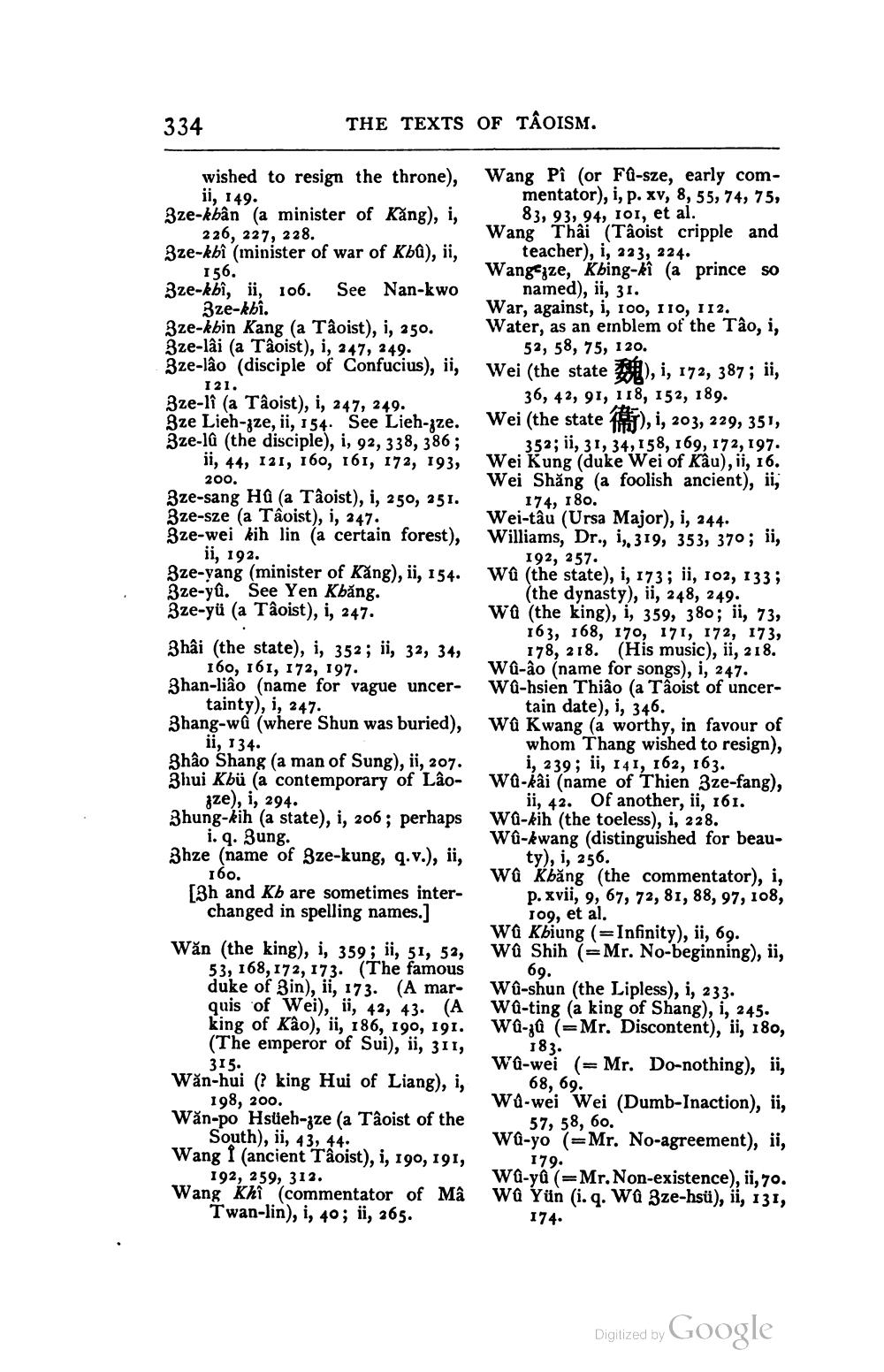________________
334
THE TEXTS OF TÂOISM.
wished to resign the throne),
ii, 149. 3ze-khân (a minister of Kăng), i,
226, 227, 228. 3ze-khi (ininister of war of KbQ), ii,
156. Sze-kbi, ii, 106. See Nan-kwo
Bze-ebi. 3ze-kbin Kang (a Taoist), i, 250. Bze-lâi (a Taoist), i, 247, 249. ¿ze-lâo (disciple of Confucius), ii,
121. 3ze-li (a Tâoist), i, 247, 249. Sze Lieh-jze, ii, 154. See Lieh-zze. Sze-lů (the disciple), i, 92, 338, 386;
ii, 44, 121, 160, 161, 172, 193,
200. 3ze-sang HQ (a Tâoist), i, 250, 251. 3ze-sze (a Tâoist), i, 247. Bze-wei kih lin a certain forest),
ii, 192. Sze-yang (minister of Kang), ii, 154. 3ze-yû. See Yen Kbăng. ¿ze-yü (a Tâoist), i, 247.
Zhai (the state), i, 352; ii, 32, 34,
160, 161, 172, 197. Zhan-lião (name for vague uncer-
tainty), i, 247. Zhang-wu (where Shun was buried),
ii, 134. Shâo Shang (a man of Sung), ii, 207. Zhui Kbü (a contemporary of Lâo-
zze), i, 294. Zhung-kih (a state), i, 206; perhaps
Wang Pi (or Fa-sze, early com
mentator), i, p. xv, 8, 55, 74, 75,
83, 93, 94, 1oi, et al. Wang Thai (Taoist cripple and
teacher), i, 223, 224. Wang=zze, Kbing-ki (a prince so
named), ii, 31. War, against, i, too, ITO, 112. Water, as an emblem of the Tâo, i,
52, 58, 75, 120. Wei (the state *), i, 172, 387; ii,
36, 42, 91, 118, 152, 189. Wei (the state M), i, 203, 229, 351,
352; ii, 31, 34,158, 169, 172,197. Wei Kung (duke Wei of Kâu), ii, 16. Wei Shăng (a foolish ancient), ii,
174, 180. Wei-tâu (Ursa Major), i, 244. Williams, Dr., i,,319, 353, 370; ii,
192, 257. Wů (the state), i, 173; ii, 102, 133;
(the dynasty), ii, 248, 249. wa (the king), i, 359, 380; ii, 73,
163, 168, 170, 171, 172, 173,
178, 218. (His music), ii, 218. Wu-ko (name for songs), i, 247. WG-hsien Thiâo (a Taoist of uncer
tain date), i, 346. Wa Kwang (a worthy, in favour of
whom Thang wished to resign),
i, 239; ii, 141, 162, 163. Wu-kâi (name of Thien 3ze-fang),
ii, 42. Of another, ii, 161. WG-kih (the toeless), i, 228. Wû-kwang (distinguished for beau
ty), i, 256. Wû Kbăng (the commentator), i,
p. xvii, 9, 67, 72, 81, 88, 97, 108,
109, et al. Wü Kbiung (=Infinity), ii, 69. Wu Shih (=Mr. No-beginning), ii,
69. Wh-shun (the Lipless), i, 233. W G-ting (a king of Shang), i, 245. WG-zû (=Mr. Discontent), ii, 180,
183. Wû-wei (= Mr. Do-nothing), ii,
68, 69. Wů-wei Wei (Dumb-Inaction), ii,
57, 58, 60, Wa-yo (=Mr. No-agreement), ii,
179. WU-ya (=Mr. Non-existence), ii, 70. WG Yün (i.q. WG ¿ze-hsü), ii, 131,
Bhze: 9. Bu a state)
Zhze (name of Sze-kung, q.v.), ii,
16o. [Bh and Kb are sometimes inter
changed in spelling names.]
Wăn (the king), i, 359; ii, 51, 52,
53, 168, 172, 173. (The famous duke of Zin), ii, 173. (A marquis of Wei), ii, 42, 43. (
A king of Kâo), ii, 186, 190, 191. (The emperor of Sui), ii, 311,
315. Wăn-hui (? king Hui of Liang), i,
198, 200. Wăn-po Hsüeh-zze (a Taoist of the
South), ii, 43, 44: Wang 1 (ancient Taoist), i, 190, 191,
192, 259, 312. Wang Khi (commentator of Mâ
Twan-lin), i, 40; ii, 265.
174.
Digitized by Google




